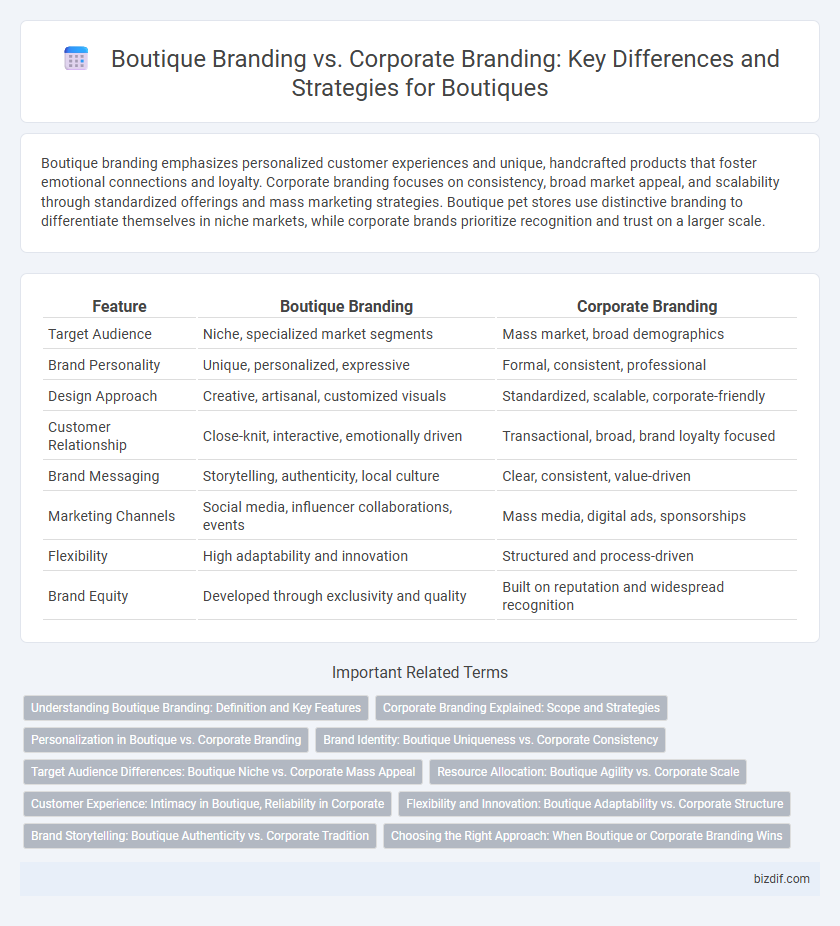Boutique branding emphasizes personalized customer experiences and unique, handcrafted products that foster emotional connections and loyalty. Corporate branding focuses on consistency, broad market appeal, and scalability through standardized offerings and mass marketing strategies. Boutique pet stores use distinctive branding to differentiate themselves in niche markets, while corporate brands prioritize recognition and trust on a larger scale.
Table of Comparison
| Feature | Boutique Branding | Corporate Branding |
|---|---|---|
| Target Audience | Niche, specialized market segments | Mass market, broad demographics |
| Brand Personality | Unique, personalized, expressive | Formal, consistent, professional |
| Design Approach | Creative, artisanal, customized visuals | Standardized, scalable, corporate-friendly |
| Customer Relationship | Close-knit, interactive, emotionally driven | Transactional, broad, brand loyalty focused |
| Brand Messaging | Storytelling, authenticity, local culture | Clear, consistent, value-driven |
| Marketing Channels | Social media, influencer collaborations, events | Mass media, digital ads, sponsorships |
| Flexibility | High adaptability and innovation | Structured and process-driven |
| Brand Equity | Developed through exclusivity and quality | Built on reputation and widespread recognition |
Understanding Boutique Branding: Definition and Key Features
Boutique branding emphasizes personalized customer experiences, niche market focus, and unique brand identity often reflected through customized products and intimate brand storytelling. Unlike corporate branding, which targets mass markets and maintains consistency across broad demographics, boutique branding thrives on exclusivity, artisanal craftsmanship, and emotional connections with a smaller, loyal customer base. Key features include distinct visual aesthetics, tailored marketing strategies, and a strong emphasis on authenticity and community engagement.
Corporate Branding Explained: Scope and Strategies
Corporate branding encompasses a comprehensive approach to establishing a unified identity across all organizational touchpoints, emphasizing consistency in messaging, visuals, and values to build long-term trust and recognition. Strategies include leveraging brand architecture, corporate storytelling, and integrated marketing communications to align internal culture with external perceptions. The scope extends beyond logos to encompass reputation management, employee engagement, and stakeholder relationships, ensuring a cohesive brand experience that drives business growth and competitive advantage.
Personalization in Boutique vs. Corporate Branding
Boutique branding emphasizes personalized customer experiences through tailored services and unique brand storytelling, fostering strong emotional connections with niche audiences. Corporate branding often relies on standardized messaging and broad market appeal, limiting opportunities for individual customization. Personalized approaches in boutique branding enhance customer loyalty by addressing specific preferences and values, unlike the mass-oriented strategies typical of corporate brands.
Brand Identity: Boutique Uniqueness vs. Corporate Consistency
Boutique branding emphasizes a distinct brand identity that highlights uniqueness through personalized experiences and niche market appeal, creating strong emotional connections with customers. In contrast, corporate branding prioritizes consistent brand elements like logos, colors, and messaging across all platforms to maintain a unified and recognizable presence worldwide. Boutique brands thrive on differentiation and tailored storytelling, while corporate brands rely on standardized guidelines to build trust and reliability at scale.
Target Audience Differences: Boutique Niche vs. Corporate Mass Appeal
Boutique branding targets niche audiences seeking unique, personalized experiences that emphasize craftsmanship and exclusivity. Corporate branding aims at mass appeal, focusing on broad recognition, consistency, and streamlined messaging to attract diverse consumer groups. The distinct target audience strategies highlight boutique brands' emphasis on depth and emotional connection versus corporate brands' pursuit of scale and market dominance.
Resource Allocation: Boutique Agility vs. Corporate Scale
Boutique branding leverages agile resource allocation to deliver highly personalized and innovative marketing strategies, allowing faster adaptation to market trends and consumer preferences. Corporate branding benefits from extensive resources and economies of scale, enabling large-scale campaigns with significant reach and consistent brand messaging across diverse markets. Boutique agility fosters creative experimentation, while corporate scale ensures stability and widespread brand recognition.
Customer Experience: Intimacy in Boutique, Reliability in Corporate
Boutique branding emphasizes personalized customer experience through intimacy, creating strong emotional connections and tailored interactions that foster loyalty. Corporate branding prioritizes reliability, ensuring consistent quality and trustworthiness across all customer touchpoints to maintain broad market confidence. This contrast in customer experience highlights boutique brands' focus on individualized service versus corporate brands' commitment to dependable, scalable solutions.
Flexibility and Innovation: Boutique Adaptability vs. Corporate Structure
Boutique branding thrives on flexibility and innovation, allowing smaller teams to swiftly adapt to market trends and personalize brand identity. Corporate branding often faces challenges due to rigid structures and hierarchical decision-making, which can slow innovation and limit responsiveness. Boutique adaptability fosters creative approaches and niche targeting, contrasting with the standardized processes typical in large corporate environments.
Brand Storytelling: Boutique Authenticity vs. Corporate Tradition
Boutique branding emphasizes authentic narratives that highlight personalized experiences and unique craftsmanship, creating deep emotional connections with niche audiences. Corporate branding relies on established traditions and standardized messaging to convey reliability and widespread recognition across diverse markets. Both approaches leverage storytelling but differ in intimacy and scale, with boutique brands prioritizing authenticity and corporate brands focusing on consistency.
Choosing the Right Approach: When Boutique or Corporate Branding Wins
Boutique branding excels in creating personalized, niche market connections through bespoke design and storytelling, making it ideal for small businesses or luxury products seeking distinct identity. Corporate branding, with its emphasis on consistency, scalability, and broad market recognition, suits large enterprises aiming to build a unified brand presence across diverse markets. Choosing the right approach depends on factors like target audience specificity, budget, and long-term growth strategy, where boutique branding wins in exclusivity and emotional appeal, while corporate branding dominates in reach and reliability.
Boutique Branding vs Corporate Branding Infographic

 bizdif.com
bizdif.com